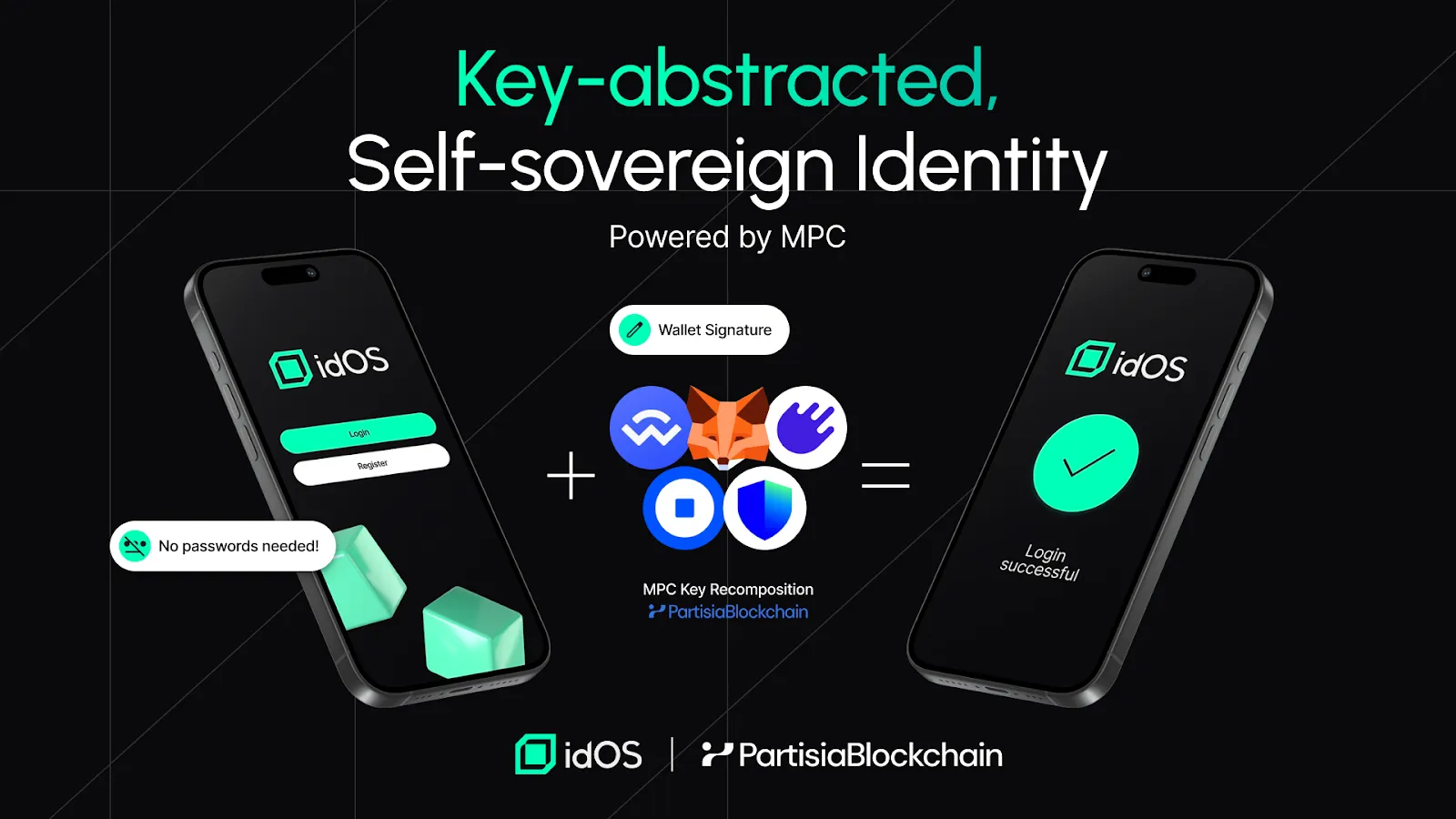Key-abstracted, Self-sovereign Identity? idOS and Partisia Blockchain MPC tech are Making It Possible
 Download File
Download FileBy partnering with Partisia Blockchain, we're simplifying decentralized identity management with passwordless access to idOS. Instead of fragile passwords or centralized authentication providers, our native Key Abstraction module ensures private keys for encrypting and decrypting user’s idOS data are securely rebuilt only when needed, through a simple wallet signature.
What is MPC?
Multi-Party Computation is a cryptographic technique that divides the computation of a private key across multiple independent parties. By doing so, no single entity ever has access to the complete key, ensuring enhanced security and privacy. This method is ideal for building secure, user-controlled, and privacy-preserving identity systems, making it a perfect fit for decentralized identity solutions like idOS. Through MPC, private keys are never fully exposed, ensuring that identity management remains both secure and user-centric.
Why MPC for identity?
Key abstraction through MPC bridges the gap between self-sovereignty and a better user experience. No seed phrases. No passwords. No new apps. Just secure, compliant, and user-controlled identity.
Traditional methods, like requiring users to remember passwords or rely on centralized custodians introduces unnecessary friction and risk. Instead, with MPC, idOS reconstructs private keys only when needed, on-demand and under-the-hood, triggered by a simple wallet signature. This means users never need to manage or even see their private keys.
The result is an experience as smooth as traditional OAuth: passwordless, invisible, and effortless. With MPC embedded in idOS, users can focus on what matters without worrying about key management. It just works securely in the background, giving users complete control over their identity without the complexity.
How It Works
As a Building Partner of the idOS network, Partisia Blockchain contributes a native MPC engine that acts as the cryptographic backbone for secure, passwordless identity. This collaboration brings together idOS’s identity infrastructure and Partisia’s decade-plus expertise in privacy-preserving computation.

Key Setup and Usage Flow:
- Setup (new users): Connect a wallet (e.g. MetaMask), a key is automatically generated in the background and sharded across Partisia’s MPC nodes.
- Usage (existing users): Retrieve and decrypt their key by signing a message with any wallet on their profile. This signature is sent to the Partisia Blockchain, which returns the necessary material for the Enclave to reconstruct the key.
This integration ensures that users won’t need to worry about remembering their seed phrase or storing a single key themselves. Instead, their wallet (e.g., MetaMask) handles the process through MPC. When they need to sign a transaction or authenticate their identity, they will use their wallet to sign a message or transaction, and the MPC process will kick in. The wallet sends a message to the Partisia MPC network that requests the necessary fragments of the private key from different nodes to create a valid signature. The result? Instant access and full control, with zero key exposure.
"Thanks to Partisia’s key abstraction, users can manage their idOS data securely without having to download new identity wallet software or remember a password. A simple signature with their wallet of choice will suffice. Partisia will be implemented as a native module within the idOS Storage Network, the L1 blockchain at the heart of idOS."
- Ben Basche, idOS CPO
Real UX Benefits for Users
With MPC baked into idOS, users get a seamless experience, making web3 identity as smooth as OAuth in traditional applications. This means:
- No seed phrases to remember
- No passwords or passkeys to manage
- No new wallets or apps to install
- Just sign with any wallet (e.g., MetaMask) and go
Secure by Design: Private Key Sharding
With MPC, private keys are never stored in full. Instead, they’re split into fragments stored across independently operated nodes. Only a quorum of nodes can reconstruct the key, and only temporarily. Brute-force or phishing-style attacks are practically useless since there’s no full key to compromise. This means:
- No vaults to hack
- No backups to steal
- No single point of failure
“The partnership with idOS marks a pivotal moment not just for Partisia Blockchain, but for the future of digital identity in web3. For years, the space has struggled to reconcile usability, compliance, and key security without compromise. By integrating our enterprise-grade MPC directly into the idOS stack, we’ve eliminated the single point of failure that has held back truly self-sovereign identity. This is not a theoretical advance, it’s a market ready solution. Together, we’ve built a zero-custody, privacy-preserving identity infrastructure that is both enterprise-ready and developer-friendly. It’s a critical step toward a more secure and user-centric internet."
- Yusef Fanous, Partisia Blockchain CCO
Compliance, Cryptographically Enforced
Beyond UX and security, MPC supports privacy and compliance by design.This isn’t just compliance as a policy, it’s compliance enforced through cryptography:
- Private keys only exist momentarily, during user-triggered actions
- Access is ephemeral and auditable
- Regulators can verify permissions/revocations without accessing raw personal data
- Users retain full control, satisfying consent requirements
What Comes Next
We’re not launching this into the wild just yet, MPC key abstraction is undergoing testing with selected applications. Public onboarding is expected in Q4 2025.
This integration marks a turning point for web3 identity: one where users gain seamless access and full control, while developers get scalable, secure, and compliant identity infrastructure. MPC key abstraction with Partisia makes self-sovereign identity truly seamless and invisible.
Wrapping up
By integrating Multi-Party Computation as a native module within the idOS Storage Network (the L1 blockchain at the heart of idOS) we're eliminating the need for passwords, seed phrases, or new apps in order for users to own their own data. For users, this makes web3 identity as seamless as traditional login systems, while also offering developers a compliant, secure, and scalable solution for decentralized identity management.
